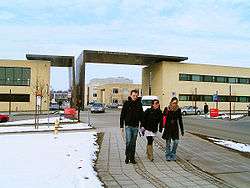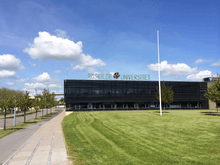Roskilde University
| Roskilde Universitet | |
 | |
| Motto | In tranquillo mors - in fluctu vita (Latin) |
|---|---|
Motto in English | In silence, death; in the surge, life |
| Type | Public |
| Established | 1972 |
| Budget | DKK 774,956,000 ($ 117,100,005) (2014) [1] |
| Rector | Hanne Leth Andersen |
Academic staff | 538 (2014) [1] |
Administrative staff | 402 (2014) [1] |
| Students | 8,045 (2014)[1][2] |
| Undergraduates | 4,751 (2014) [1] |
| Postgraduates | 3,294 (2014) [1] |
| 299 (2014) [1] | |
| Location |
Roskilde, Denmark 55°39′10″N 12°08′25″E / 55.65278°N 12.14028°ECoordinates: 55°39′10″N 12°08′25″E / 55.65278°N 12.14028°E |
| Campus | Trekroner, Roskilde |
| Affiliations | EUA, UArctic |
| Website | ruc.dk |
Roskilde University (Danish: Roskilde Universitet, abbreviated RUC or RU) is a Danish public university founded in 1972 and located in Trekroner in the Eastern part of Roskilde. The university awards bachelor's degrees, master's degrees, and Ph.D. degrees in a wide variety of subjects within social sciences, the humanities, and natural sciences.
History

The university was founded in 1972 and was initially intended as an alternative to the traditional Danish universities which had been the scene of several student uprisings in the late 1960s. The students considered the traditional universities undemocratic and controlled by the professors and wanted more influence as well as more flexible teaching methods.
In the 1970s the university was known for its very liberal education as opposed to the usual lectures provided by the more traditional universities of Copenhagen and Aarhus. The focus was shifted from traditional lectures to group orientated methods and projects rather than traditional exams.
Back in 1972, these educational ideas were both unorthodox and controversial, but the traditional universities in Denmark have now adopted much of the original RU concept themselves, not least the concept of group project work, which is today a recognised academic method. RU can also be said to have brought to Denmark the Anglo-Saxon concepts of interdisciplinarity and less well-defined boundaries between academic fields.[3]
Organization and Administration

The university is governed by a board consisting of 9 members: 5 members recruited outside the university form the majority of the board, 1 member is appointed by the scientific staff, 1 member is appointed by the administrative staff, and 2 members are appointed by the university students. The Rector is appointed by the university board. The rector in turn appoints deans and deans appoint heads of departments. There is no faculty senate and faculty is not involved in the appointment of rector, deans, or department heads. Hence the university has no faculty governance.[4]
Degree programs
Roskilde University offers higher education at bachelor-, master, and Ph.D. levels within four main areas: humanities, humanistic technologies, social science and science. The traditional educational setup at RU was based on two years of general studies in one of the main scientific areas and four years of specialization. Today, the university follows the general educational structure in Denmark based on three years of bachelor studies qualifying for a two-year master study.[5][6]
Roskilde University has 4 departments (institutes) specializing in very different areas from Mathematics to International Development:
- Department of Communication and Arts (DCA)
- Department of Science and Environment (DSE)
- Department of People and Technology (DPT)
- Department of Social Sciences and Business
The university offers three international bachelor programmes:
- International Bachelor Study Programme in the Humanities
- International Bachelor Study Programme in the Natural Sciences
- International Bachelor Study Programme in Social Science [7]
Rankings
- QS World University Rankings 2015/6: Politics & International Studies, 151-200,[8] Communication & Media Studies, 151-200.
- Times Higher Education World University Rankings 2017: ranked 501-600 [9]
- Academic Ranking of World Universities 2016: unranked[10]
Notable alumni
Some notable alumni and professors from RUC include:
- Andreas Bang Hemmeth (DJ Encore)
- Johanne Schmidt-Nielsen, politician
- Simon Emil Ammitzbøllm politician
- Vincent F. Hendricks
- Hartmut Haberland
- Pernille Andersen[11]
- Christine Gyrsting Lorentzen
- Rūta Vainienė
- Eyðgunn Samuelsen
- Anders Bæksgaard, journalist, political editor at Politiken
See also
References
- 1 2 3 4 5 6 7 http://www.dkuni.dk/Statistik/Universiteternes-statistiske-beredskab. Missing or empty
|title=(help) - ↑ http://www.statistikbanken.dk/INST08
- ↑ http://www.ruc.dk/en/about-the-university/rucs-profil/the-history-of-roskilde-university/
- ↑ "Roskilde Universitet - Bestyrelse". Retrieved 2009-11-20.
- ↑ http://www.sam.sdu.dk/e/study/guide/seks.shtml
- ↑ http://www.rektorkollegiet.dk/typo3conf/ext/naw_securedl/secure.php?u=0&file=fileadmin/user_upload/downloads/uni-edu-den.pdf&t=1190564872&hash=d5dd32654ff19b2356cc15b295a0241e
- ↑ http://www.ruc.dk/en/education/full-degree-undergraduate-programmes
- ↑ http://www.topuniversities.com/university-rankings/university-subject-rankings/2016/politics#sorting=rank+region=+country=+faculty=+stars=false+search=
- ↑ https://www.timeshighereducation.com/world-university-rankings
- ↑ http://www.shanghairanking.com/ARWU2016.html
- ↑ http://www.fashionmodeldirectory.com/models/Pernille_Andersen/